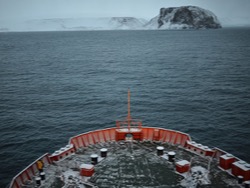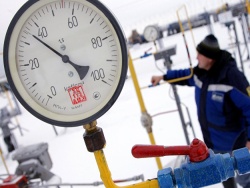
Global warming has caused ice melting in the Arctic, and the world’s attention was confined to the Arctic ocean. Many economies are related to the fact that in the Arctic it may take a new route. Also increasing competition between different countries around oil and other minerals in the Arctic. Japan has accumulated extensive experience in the field of Arctic studies, but its position is weak. In what form should be Japan’s Arctic policy? We discussed with the special representative of Japan on the Arctic Kazuko Shiraishi (Shiraishi Kazuko) and the Deputy Director of the State Institute of polar research Hiroyuki Enomoto (Hiroyuki Enomoto).
Nikkei: Why the Arctic is now at the centre of world attention?
— From late 1970-ies it became clear that Arctic warming faster than other regions. The world has realized the need to take action because this process affects the climate and ecosystem of the whole Earth. As a result of the ice melting there are more opportunities to use the Northern sea route. Also great expectations are associated with the development of natural resources of the continental shelf. Japan was an observer in the Arctic Council (the Arctic States discuss issues such as climate and natural resources) since 2009. In 2013, she received the status of permanent observer. In October last year, the Maritime policy of Japan, which is headed by the Prime Minister, published “the Arctic policy of Japan”. Japanese industry has not yet reached the level of active participation in Arctic projects, however, I feel that interest is growing.
— What have you done in the first place, becoming a representative?
— It was important to announce to the world that Japan has formulated Arctic policy and attempts to play a crucial role for solving various problems. We would like to emphasize that the problems of the Arctic need to be addressed together, since they affect the whole world. Japan can play a leading role in the field of research and study of the Arctic, with its strong scientific base. The government carries out active scientific and technological diplomacy. Earlier, it was mostly conducted diplomacy for the promotion of science and technology. In the case of the Arctic science and technology base can be applied in diplomatic purposes. Japan would like to become a reliable player, contributing to the solution of international problems with the help of science and technology. It will implement its public debt, which would strengthen its impact.
— What are the next challenges of Arctic natural resources?
— The United States stressed the need to establish fishing regulations for international waters are not under the sovereignty of any of the Arctic countries. In addition to the Arctic Council, they want to create another international structure, which will include non-Arctic countries for long-term use of fish resources. The negotiations on this issue should begin in the near future. Japan has not yet decided if she would support the American project, but she agreed with the need for long-term use. Japanese technologies will contribute to gaining control over fish resources and plankton organisms.
— You’ll be supporting a private business?
— We actively share information about business opportunities in the Arctic. Embassy of Japan in Finland in the period from 2014 to 2015 three times organized mission Arctic recon. The event was attended by a large number of representatives from universities, research institutes and industry. We even visited Norway, where he talked with representatives of local businesses and research institutes. Also we want to visit Denmark and Sweden. In addition, in 2014, the Agency for natural resources and energy of Japan signed a Memorandum of intent with Alaska, the essence of which consists in the exchange of information to promote LNG projects. If the industry will offer specific projects, we will provide assistance by interacting with the relevant ministries and offices.
— With the development of the Arctic without Russia not to manage.
— Main Arctic routes pass through the territory of Russia. In this case, since there is uncertainty with tariffs on Russian icebreakers, whose services must be used when passing along the route, the Ministry of land, infrastructure, transport and tourism of Japan made an inquiry about this problem. Japanese scholars also note that we can not freely use the Russian research data. Scientific cooperation in the Arctic is beneficial to both Russia and Japan. We informed the representative of the Russian government, which is on the short leg with the President that Russia can freely use the Japanese technique of observations and information.
— What do you expect from the USA who lead the Arctic Council?
— President Obama participated in an International conference on global leadership in the Arctic, which was held in Alaska in August-September last year. The current U.S. President first visited the Arctic region, which suggests that the us authorities have changed their attitude towards Arctic issues. The U.S. is trying to reconsider the essence of the Arctic Council given the impact that Arctic problems on the whole world. Washington’s position is to go beyond problems such as climate change and indigenous people. He wants to solve the problems of the entire international community, not just the Arctic countries. This approach gives the chance to Japan, the country-the observer who wants to play a more important role. We will make every effort to do so.








